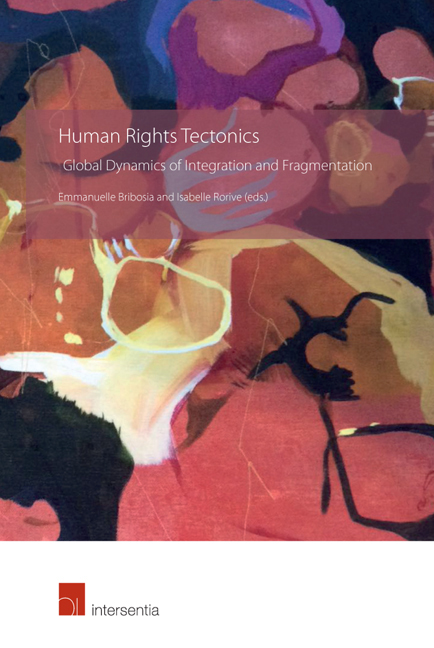Book contents
- Frontmatter
- Foreword
- Contents
- List of Cases
- List of Contributors
- Introduction to Human Rights Tectonics
- PART I PROMISES AND CHALLENGES OF AN INTEGRATED APPROACH TO HUMAN RIGHTS
- PART II HUMAN RIGHTS TECTONICS THROUGH AN ISSUE-BASED APPROACH
- Why a Global Approach to Non-Discrimination Law Matters: Struggling with the ‘Conscience’ of Companies
- Sexual and Reproductive Rights at the Crossroads: Intersectionality and the UN Treaty Monitoring Bodies
- The Integration of Cultural and Economic Rights by Regional Human Rights Courts
- The Use of External Instruments by the European Court of Human Rights: (Missed) Opportunities for the Rights of Persons with Disabilities
- PART III HUMAN RIGHTS DYNAMICS IN EUROPE
- About the Editors
Why a Global Approach to Non-Discrimination Law Matters: Struggling with the ‘Conscience’ of Companies
from PART II - HUMAN RIGHTS TECTONICS THROUGH AN ISSUE-BASED APPROACH
Published online by Cambridge University Press: 31 January 2019
- Frontmatter
- Foreword
- Contents
- List of Cases
- List of Contributors
- Introduction to Human Rights Tectonics
- PART I PROMISES AND CHALLENGES OF AN INTEGRATED APPROACH TO HUMAN RIGHTS
- PART II HUMAN RIGHTS TECTONICS THROUGH AN ISSUE-BASED APPROACH
- Why a Global Approach to Non-Discrimination Law Matters: Struggling with the ‘Conscience’ of Companies
- Sexual and Reproductive Rights at the Crossroads: Intersectionality and the UN Treaty Monitoring Bodies
- The Integration of Cultural and Economic Rights by Regional Human Rights Courts
- The Use of External Instruments by the European Court of Human Rights: (Missed) Opportunities for the Rights of Persons with Disabilities
- PART III HUMAN RIGHTS DYNAMICS IN EUROPE
- About the Editors
Summary
On 6 October 2017, the Trump Administration expanded the range of employers and insurers that can invoke religious or moral beliefs in order to avoid birth control pills and other contraceptives being covered by insurance as part of preventive care under the Patient Protection and Affordable Care Act (ACA or Obamacare). While efforts to repeal the ACA entirely were unsuccessful, the Trump Administration adopted two companion interim final rules to extend the right of conscientious objection to for-profit entities that are not closely held (including publicly traded companies), as is already the case for churches and religious orders, non-profit organisations or closely held for profit entities. The reaction was immediate. The American Civil Liberties Union (ACLU) filed a lawsuit against this measure, arguing ‘that the interim rules violate the Establishment Clause and the Equal Protection Clause of the Constitution by authorizing and promoting religiously motivated and other discrimination against women seeking reproductive health care’. An ACLU senior staff attorney stressed that ‘the federal government cannot authorize discrimination against women in the name of religion or otherwise’.
Simultaneously, stories of cakes are making headlines on both sides of the Atlantic. The debate revolves around the refusal by Ashers Baking Company in Northern Ireland and Masterpiece Cakeshop Ltd in Colorado to create, in the first case, a wedding cake with the words ‘Support Gay Marriage’ and, in the second case, a wedding cake for a buff et in honour of same-sex couples. The Supreme Court of the United Kingdomand the Supreme Court of the United Statesagreed to hear these cases. In addition to the issue of equal access to goods and services, they both touch on the extent to which companies can invoke freedom of religion or expression in order to disregard the right of non-discrimination on the grounds of sexual orientation.
In parallel to this, the Achbita and Bougnaoui judgments – delivered in March 2017 by the Court of Justice of the European Union on two preliminary references from the Courts of Cassation of Belgium and France – were also making headlines. Even if the Court of Justice has not given companies a blank cheque to forbid the Islamic headscarf (hijab) in the workplace in the name of a ‘neutral’ brand image, it is often in this way that these judgments are interpreted.
- Type
- Chapter
- Information
- Human Rights TectonicsGlobal Dynamics of Integration and Fragmentation, pp. 111 - 140Publisher: IntersentiaPrint publication year: 2018



